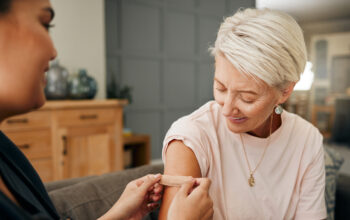Vaccines can unlock a brighter future for people around the world

Coronavirus Treatment And Vaccination. Mature Lady In Mask Signing Papers With Doctor In Hospital Waiting-Room. Plasma Donations From Corona Virus Donors, Covid-19 Pandemic Medical Campaign Concept
With a vaccine pipeline that can tackle today’s and tomorrow’s challenges, the life-saving potential of vaccines is more far-reaching than we know.
From routine childhood immunisation to seasonal flu or COVID-19, vaccines are important for our health. In fact, four million deaths are prevented each year from childhood vaccination alone. Within the next seven years, it is estimated that another 50 million deaths could be prevented, and that’s the tip of the iceberg when it comes to the future of vaccines.
Vaccines prevent existing illness
By 2030, the number of people aged 60 years and over is expected to increase by more than one-third, rising to 1.4 billion — and 2.1 billion by 2050. New and improved vaccines can protect this growing demographic against severe and life-threatening illnesses caused by infections such as influenza, pneumococcal, herpes zoster and respiratory syncytial virus (RSV). They can also have a positive socioeconomic and cost-saving impact and reduce pressures on health systems.
In some cases, we can aspire to eliminate certain illnesses. For instance, Human papillomavirus (HPV) vaccines can help prevent up to 90% of cervical cancer cases. With the widespread use of these vaccines, a world in which girls and women do not face the threat of cervical cancer is possible.
Protecting against future health risks
Vaccines can protect us against future health emergencies, whether Ebola or the next influenza pandemic. A life-course approach to vaccination for all ages helps control vaccine-preventable diseases, reduce hospitalizations and build herd immunity. Investment in prevention funding, including in infrastructure and extension of immunisation services, helps us build resilience for future outbreaks.
Against the rising threat of antimicrobial resistance (AMR), vaccines give us hope. By 2050, it is estimated that drug-resistant infections could cause as many as 10 million deaths annually. New and existing vaccines can help prevent half a million AMR-related deaths annually by preventing infections in the first place; reducing the use, misuse or overuse of antibiotics, and slowing the spread of ‘superbugs’.
Warmer global temperatures and increased rainfall due to the climate crisis also put more people at risk of mosquito-borne diseases like Dengue or Zika. Vaccines in development hold the promise of protecting more people. In the future, we will face several known and unknown viruses. Vaccines are an important line of defence — and, equally, a source of hope — for healthier lives worldwide.
This article was originally published by Media Planet on 28 September 2023.
Author






